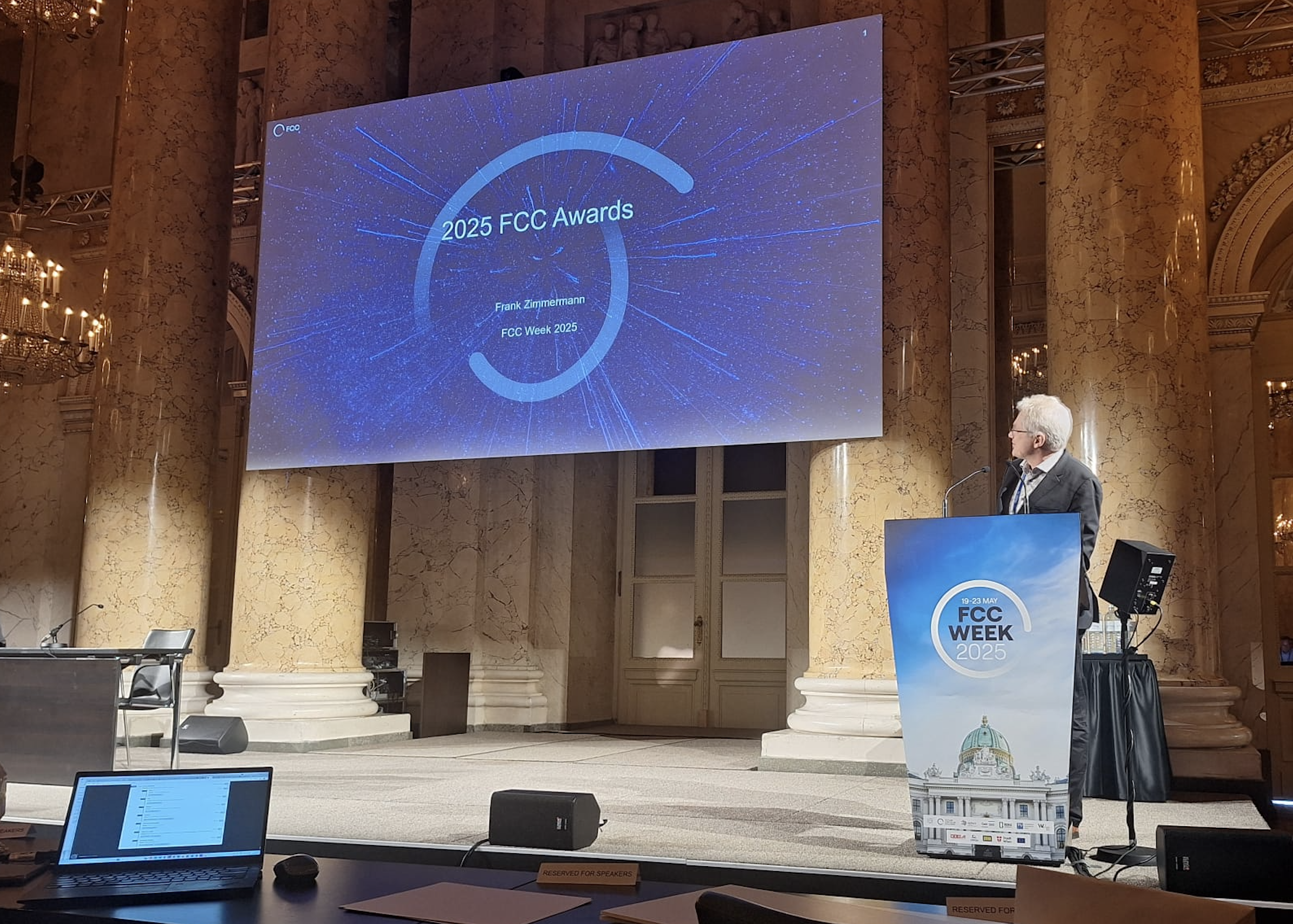
FCC Week Awards Recognize Innovation and Impact Across the Community
FCC Week 2025 not only brought together hundreds of researchers shaping the future of particle physics, but also highlighted the exceptional work being carried out by early-career scientists and engineers through the 2025 FCC Awards.
The awards spanned three categories: Best Poster Awards, FCC Innovation Awards, and the PRAB FCC Paper Awards, all aimed at celebrating creativity, scientific excellence, and relevance to the ambitious Future Circular Collider (FCC) programme.
Spotlight on Emerging Talent: Best Poster Awards
Each year, the FCC Week Poster Session provides a platform for early-career researchers to share their latest developments and creative ideas. The 2025 Poster Awards were evaluated by dedicated committees under the leadership of Guy Wilkinson (for Physics/Experiments/Detectors), helped by Freya Blekman, Alain Blondel, and Michele Selvaggi), and Tatiana Pieloni (for Accelerators) supported by Paolo Craievich and Mauro Migliorati. The poster prizes recognized clarity, originality, and technical depth.
The two awardees of the FCC week 2025 poster award are
- Tsz Hong Kwok (University of Zürich), who was recognized for his work on Time-Dependent Precision Measurement of Bs0 → ϕμ⁺μ⁻ Decay at FCC-ee, demonstrating novel approaches to flavour physics at future colliders; and
- Audrey Piccini (CERN), who presented a compelling Vibrational study of the booster and collider supporting system, essential for the mechanical stability of the FCC infrastructure.
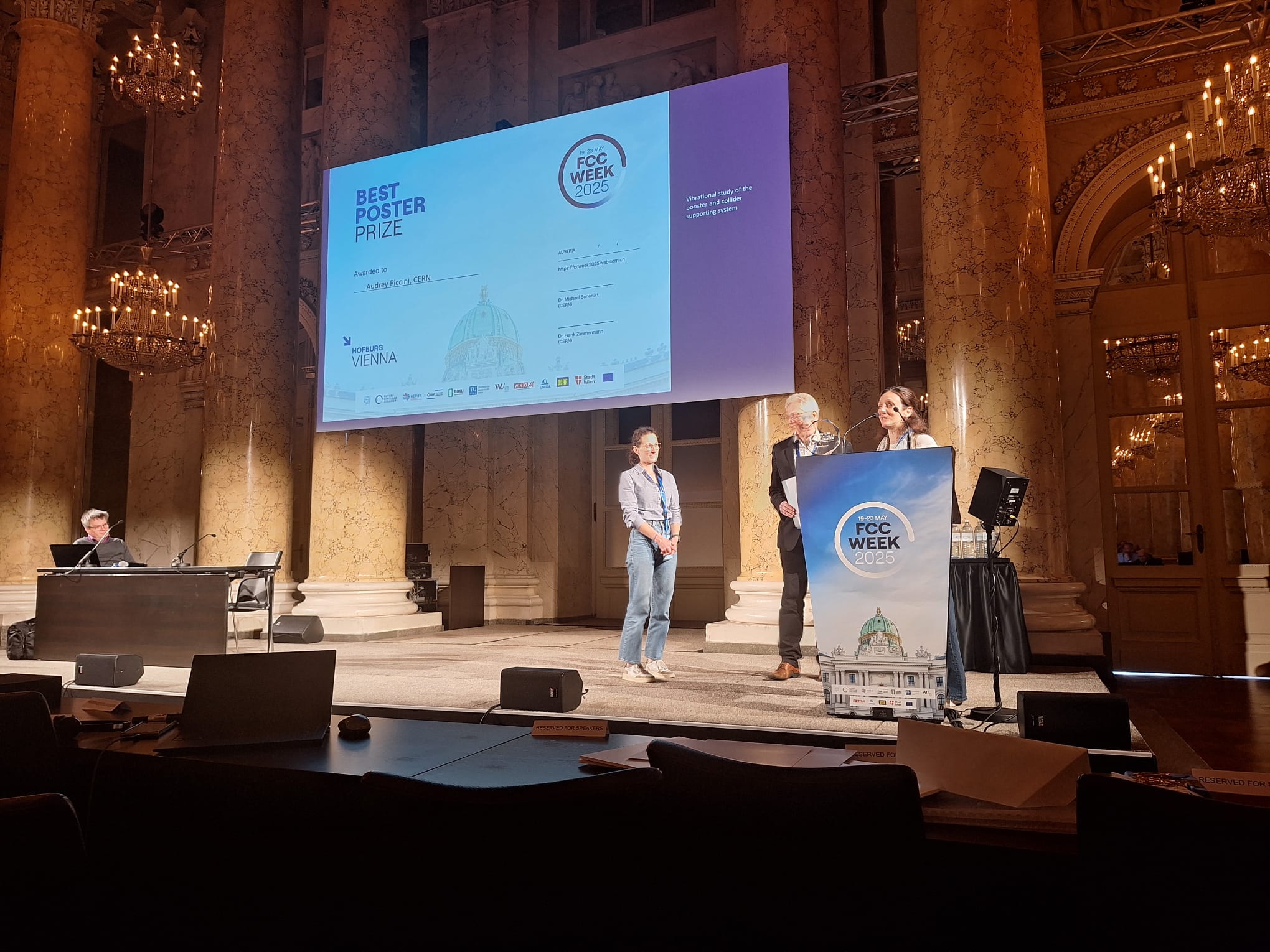
Audrey Piccini of CERN looks at the certificate for one of two Best Poster Prizes, while selection committee chair Tatiana Pieloni (EPFL) announces the reasoning behind the award.
Innovation Awards: Impact and Relevance at the Forefront
The FCC Innovation Awards celebrated projects and individuals whose work exemplifies innovation, potential impact, and alignment with FCC’s long-term goals. These awards serve as an important reminder that the path to future discoveries is paved with technological advances, creative problem-solving, and interdisciplinary collaboration. This year’s winners are Sara Aumiller (TU München) and Elaf Musa (DESY).
Sara Aumiller implemented, tested, and validated the first algorithm for identifying bottom, charm, and strange quark jets in a full detector simulation. This algorithm is a critical ingredient in assessing and refining the detector requirements for several key electroweak and Higgs measurements at the FCC-ee. She also advanced the FCC Higgs physics program by studying two novel Higgs decay channels, which led to an improved expected sensitivity to the Higgs boson’s total natural width. Sara achieved this broad spectrum of results in just over a year, testifying to the excellence of her work. Elaf Musa, who had been a DESY doctoral student in the frame of the EU project FCC Innovation Study, was recognised for her successful development of FCC-ee optics correction procedures in presence of significant magnet misalignments and field errors, which almost fully restore the ideal machine performance. This achievement had prior to Elaf’s work been considered impossible by various experts.
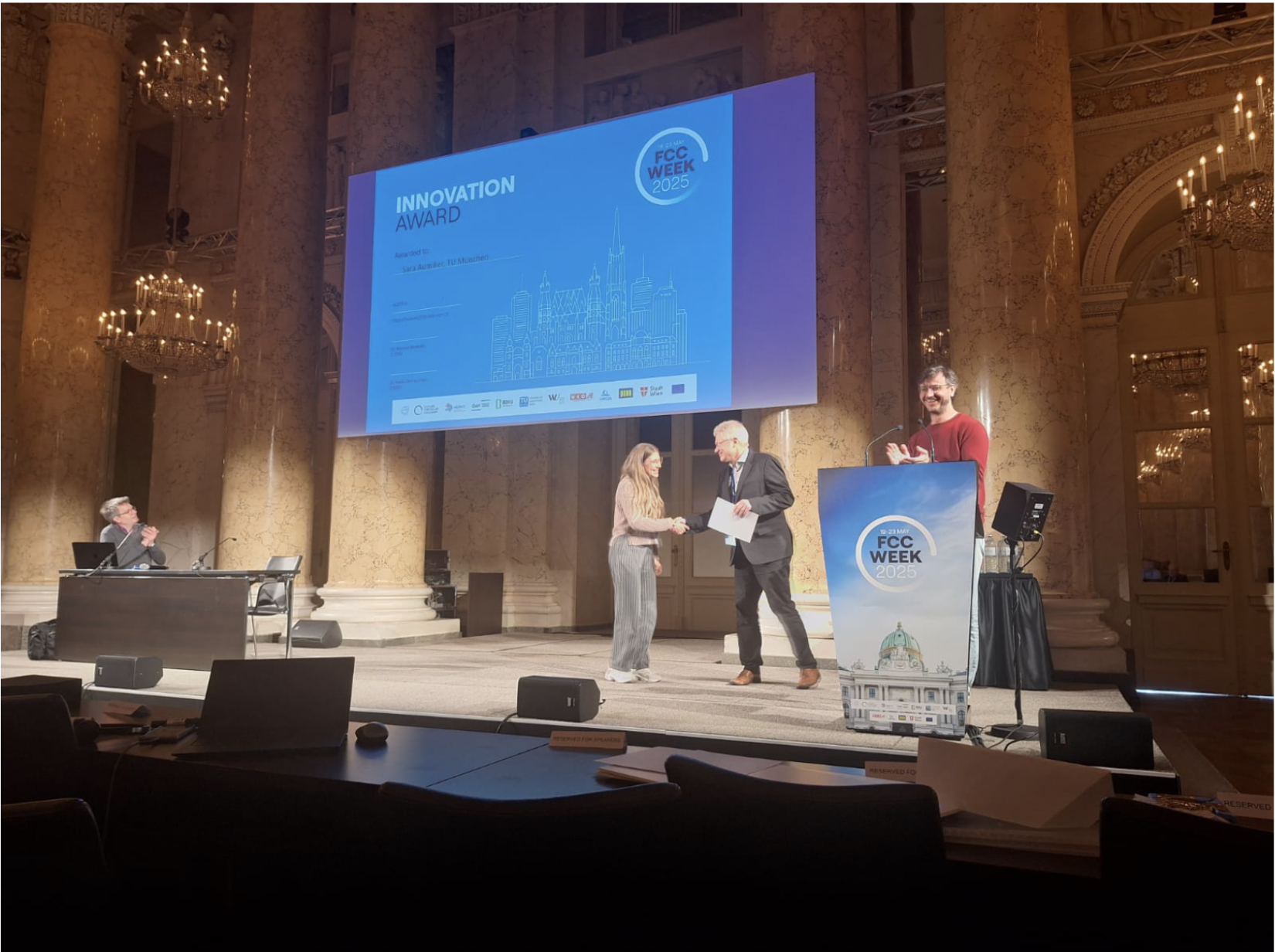
Sara Aumiller of TU München receives one of the two 2025 FCC Innovation awards from Frank Zimmermann and Michele Selvaggi.
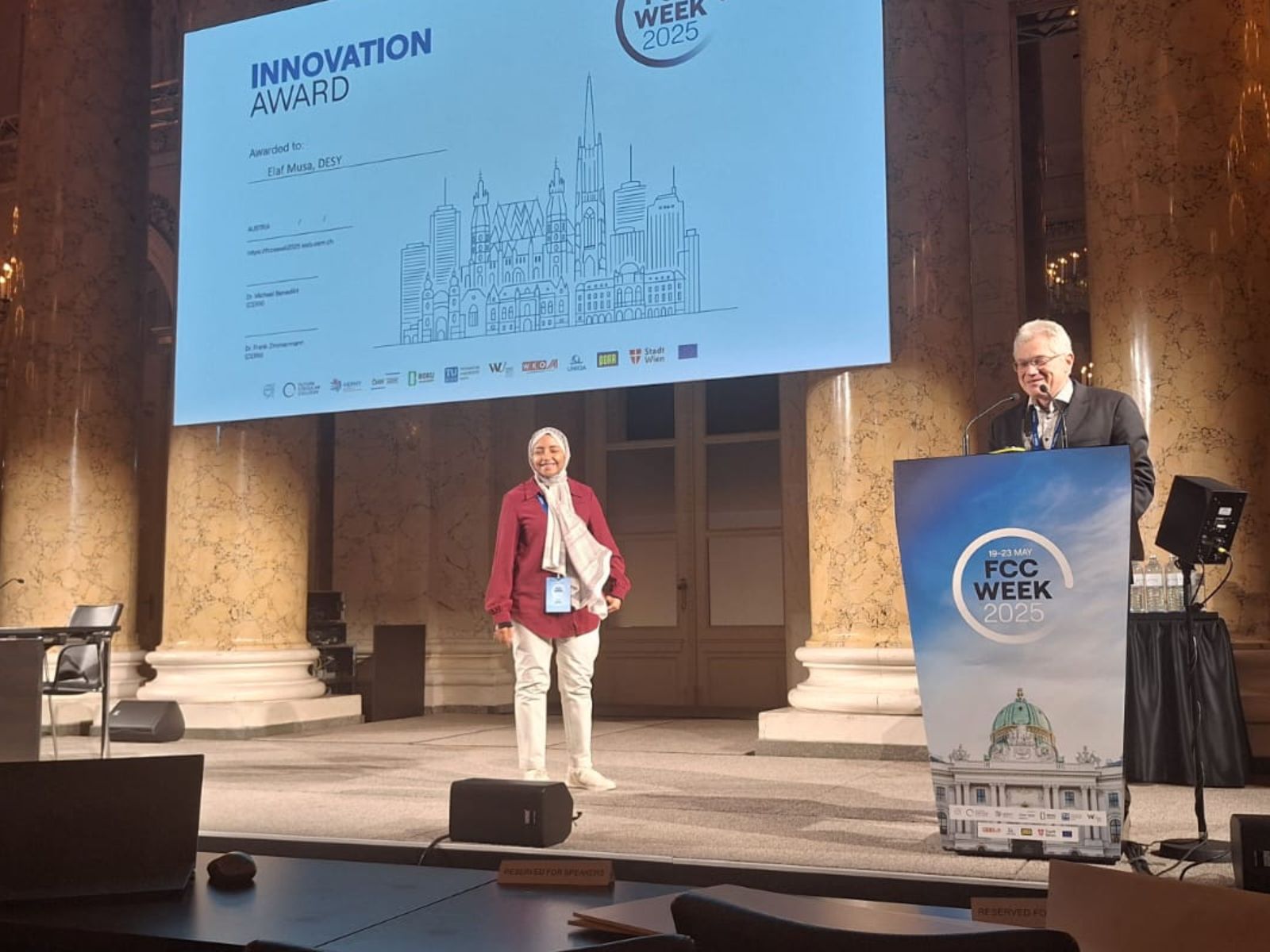
Elaf Musa, currently a postdoc at DESY, was the second recipient of the 2025 FCC Innovation award for her work on optics correction and accelerator tuning.
PRAB FCC Paper Awards: Excellence in Scientific Publishing
In partnership with Physical Review Accelerators and Beams (PRAB) and the American Physical Society (APS), two Early Career PRAB FCC Paper Awards were presented. These awards recognize outstanding peer-reviewed publications relevant to the FCC, reflecting both scientific rigour and innovation.
The 2025 recipients were:
- Ivan Karpov (CERN), for a suite of influential publications including studies of transient beam loading, RF power demands, higher-order-mode power loss, single- and multi-bunch instabilities in the future circular collider FCC-ee and other synchrotrons, such as:
Phys. Rev. Accel. Beams 21, 071001 – DOI: https://doi.org/10.1103/PhysRevAccelBeams.21.071001
Phys. Rev. Accel. Beams 22, 081002 – DOI: https://doi.org/10.1103/PhysRevAccelBeams.22.081002
Phys. Rev. Accel. Beams 27, 074401 – DOI: https://doi.org/10.1103/PhysRevAccelBeams.27.074401
Phys. Rev. Accel. Beams 24, 011002 – DOI: https://doi.org/10.1103/PhysRevAccelBeams.24.011002
- Nicolas Vallis (Paul Scherrer Institute), for his “Editor’s Suggestion” article on a Proof-of-principle e⁺ source for future colliders, which describes the design of the FCC-ee positron source prototype under construction at the PSI SwissFEL:
Phys. Rev. Accel. Beams 27, 013401 – DOI: https://doi.org/10.1103/PhysRevAccelBeams.27.013401
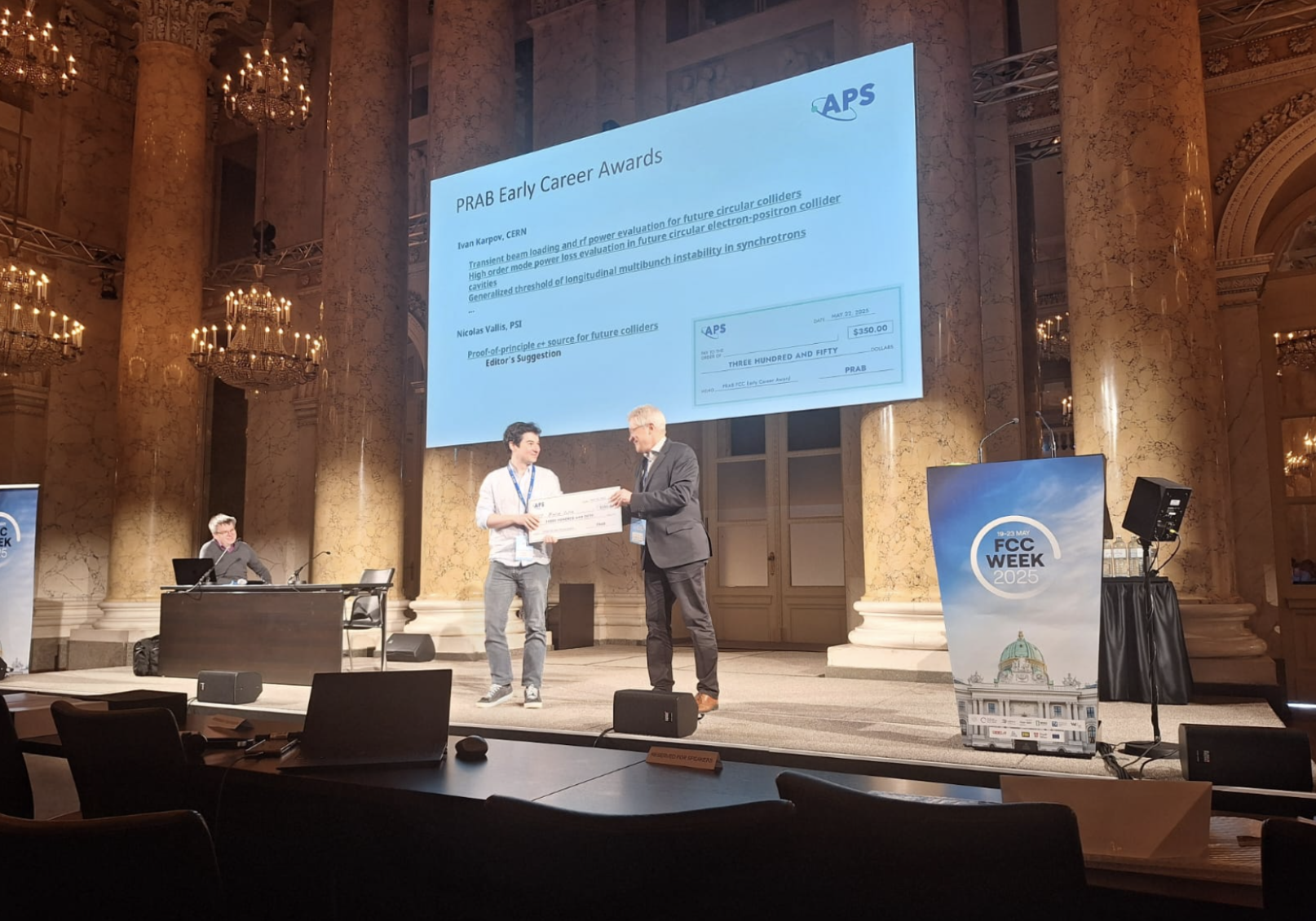
Nicolas Vallis, formerly of PSI, receives one of the two Early Career PRAB FCC Paper Awards for his work on the design of the FCC-ee positron source prototype under construction at the PSI SwissFEL.
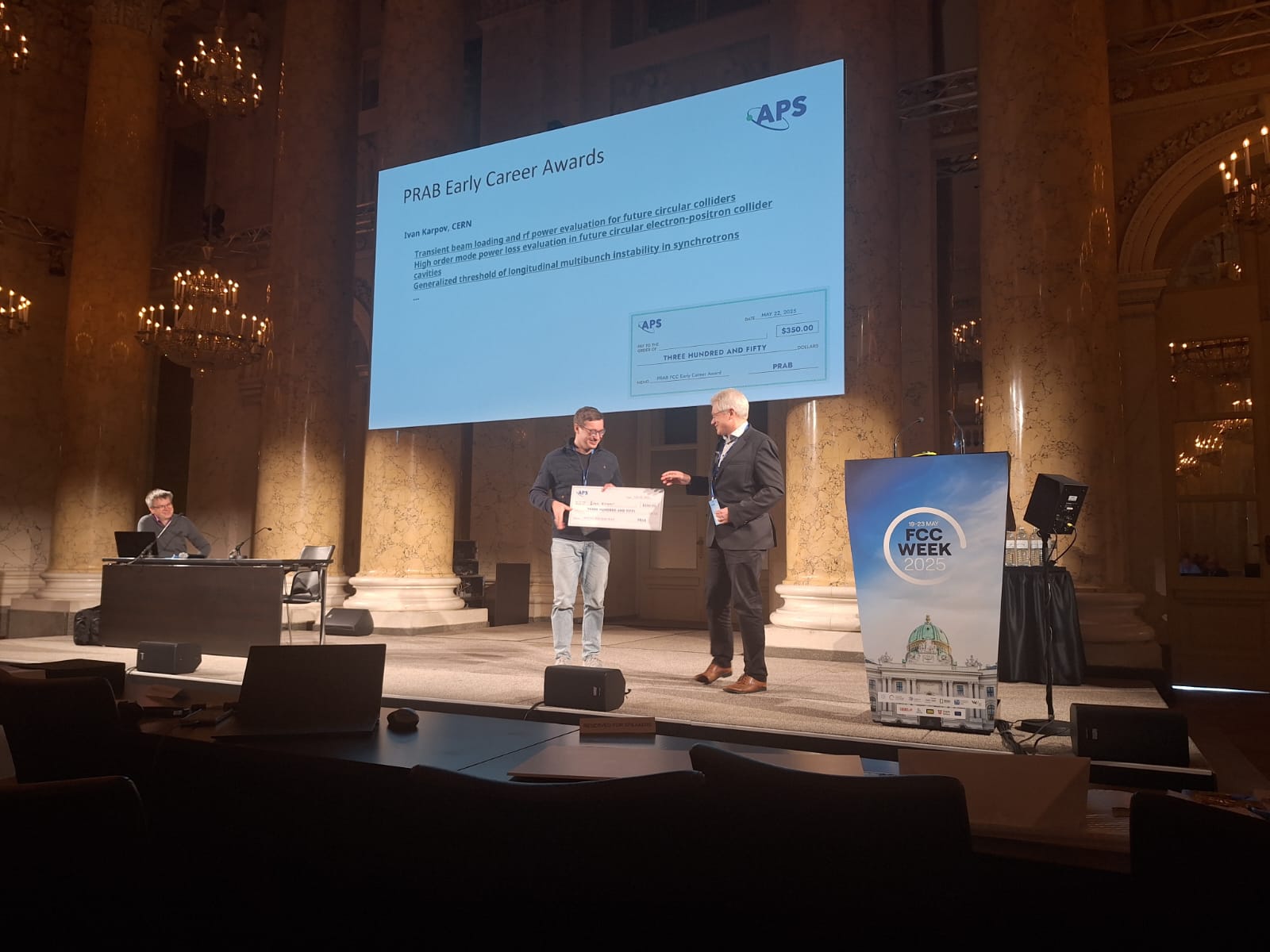
Ivan Karpov (CERN), received the second PRAB FCC Paper Award for his work in a suite of influential publications on transient beam loading, RF power requirements, higher-order-mode power loss, and beam instabilities in the Future Circular Collider FCC-ee and other synchrotrons.
A Community of Excellence
The FCC Awards continue to promote a culture of excellence, inspiring the next generation of scientists and engineers to push the boundaries of what is possible. As the FCC Feasibility Study progresses, such recognitions remind us that it is the collaborative efforts and outstanding contributions of individuals that will shape the next chapter of high-energy physics.
For more information about the awarded papers and this prime accelerator journal in general, please visit the Physical Review Accel. & Beams website.